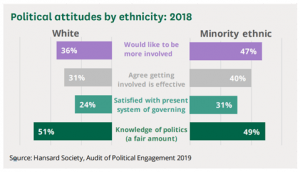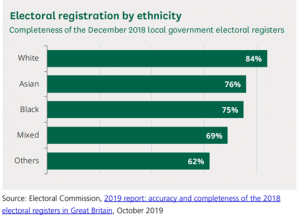“Political participation in a modern democracy is a seal of approval on individual citizenship of state belonging; it is important for the integration of citizens ad the well- being of the state.” (Mustafa, 2015) Political participation allows all individuals to come together in order to make decisions about how they would like their country to be governed and by whom.
Political participation by ethnic minorities has been predominantly low over the past decades, this is further highlighted when political participation is compared between the different ethnicities. White people tend to be more engaged in politics, according to the statistics, and many scholars have focused on finding out the reasons why. A number of different reasons have been concluded as a way for us to understand why these differences in political participation exist between different ethnicities. One of the main reasons why we see such low numbers of participation by ethnic minorities is because of the lack of representation that they get from the different political parties. Political “leaders are not known for their receptivity to minority concerns, and they use many excuses, especially division within and among minority groups,” (Burns, 2006) to avoid listening and responding to the issues that individuals who come from these ethnic minorities bring to light.
The source above illustrates that there is a higher number of individuals who come from ethnic minority backgrounds who would like to be more involved in politics compared to the number of individuals who come from white backgrounds that answered this. The reason for this can be seen as, those who come from white ethnic backgrounds have a lower turnout in this variable because there are a higher number of them who are currently participating in politics in comparison to individuals who come from ethnic minority backgrounds.
However, the amount of people who answered that they agreed that getting involved is effective was higher than the amount of people who come from white backgrounds and agreed. This demonstrates that individuals coming from ethnic minorities might be more politically participative than statistics prove them to be. “It may also be the case that traditional forms of political engagement do not consider generational changes and innovations. The development in global communication, internet usage and new media formats could affect the forms of political involvement that these young respondents engage in.” (Mustafa, 2015) The majority of statistics used to measure political participation are gathered from the amount of people who vote and the ethnic background that they belong to. However, scholars are failing to realise that there are now new ways in which people can be politically engaged. I would strongly argue that the statistics used to measure political participation by ethnic minorities is incorrect and unrepresentative.
An example of how most statistics are unrepresentative is the Black Lives Matter (BLM) movement, which rose in 2020 after the death of George Floyd. The BLM movement saw some of the highest numbers of participation by the African- American community, and possibly some of the highest numbers of participation in a political movement around the world. A movement such as the BLM movement is a prime example of how individuals who come from ethnic minority backgrounds are proud to engage in politics and take a stand when the cause that they are fighting for appeals to and includes them.
Please take time to watch this 3 minute Youtube video that sums up the BLM movement and exhibits the kind of global impact that it had: https://www.youtube.com/watch?v=4Vl4I0weXPU
The electoral registration is an official list of people who are entitled to vote in an election. As we can see in the table above the percentage of white people who are entitled to vote is higher than those who are considered to belong to ethnic minority backgrounds, such as Asians and Black people. The electoral register in this case is a prime example which can be used to support the idea that those who come from white ethnic backgrounds are more likely to vote than those who do not.
The general assumption overall tends to be that “people from minority ethnic groups are generally less likely to vote than white people,” (Heath et al, 2013) however, I believe that this is a misconstruction created by statistics. Yes, statistically it is true that most individuals who come from ethnic minority backgrounds are less likely to be politically engaged but I see this as a product of failure by the different political parties to represent all individuals in their manifestos and their policy makings. “The decision to vote may be viewed as a cost–benefit analysis made by individuals who participate only if the (usually small) benefits outweigh the (usually smaller) costs of participation.” (Fraga, 2018) All individuals who participate in politics, no matter of their ethnic background, do so because they identify with a policy in which they wish to gain for. Political parties base their policies off of public demand which is how they are able to receive votes by appealing to people’s interests. Unfortunately, most of these policies benefit individuals who comes from white ethnic backgrounds which is what leads to the low participation rates of ethnic minorities.
Bibliography:
Heath A, Fisher S, Rosenblatt G, Sanders D, Sobolewska M. (2013). The Political Integration of Ethnic Minorities in Britain. Oxford University Press. Oxford.
Burns P. F. (2006). Electoral Politics is not Enough: racial and ethnic minorities and urban politics. State University of New York Press. Albany.
Mustafa A. (2015). Identity and Political Participation among Young British Muslims: Believing and Belonging. Palgrave Macmillan UK. Hampshire.
Fraga B. L. (2018). The Turnout Gap: race, ethnicity, and political inequality in a diversifying America. Cambridge University Press. Cambridge.

